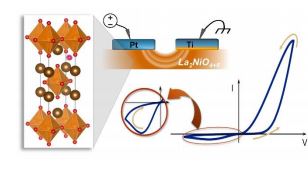
-
- au
Ici vous trouverez le papier de Klaasjan Maas
"Interface-type oxide-based valence-change memories (VCMs) with analog switching capabilities and memory transience are interesting candidates to be used as artificial synapses for the hardware implementation of artificial neural networks (ANNs) with short-term synaptic dynamics. Here, the mixed ionic-electronic conducting (MIEC) oxide La2NiO4+δ (L2NO4) is used to rationally design a new volatile interface-type valence-change memory based on a tunable p–n junction between a p-type MIEC oxide and an n-type “oxygen-reservoir” oxide. The memory does not require a forming step to trigger memristance and exhibits a highly multilevel and bipolar analog-type change in resistance, which can be continuously varied by over two orders of magnitude. A distinctive two-step memory transience where the resistance of the unbiased device increases before relaxing back to a lower resistance state was measured and has been attributed to the Fick diffusion of oxygen ions, restoring the drift-induced concentration gradients at the Ti/L2NO4 interface."


